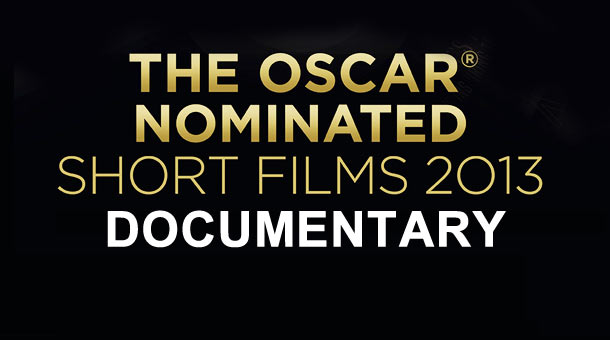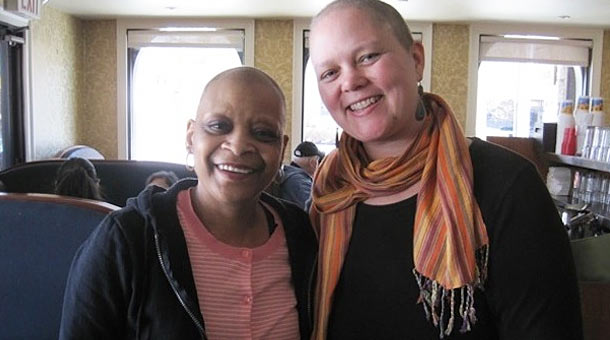2013 Oscar Nominated Shorts Spotlight: Documentary

This year’s group of short documentary nominees may look like a harrowing bunch to sit through (topics include homeless teens, African children receiving heart surgery and breast cancer patients to name a few) but that should be no reason to scare anyone off from watching them this weekend. All five shorts share a common thread of people either enduring and/or prospering under tough circumstances. The subject matter may be bleak, but they’re all great displays of human strength.
Oscar Nominated Documentary Shorts Reviews
Inocente (dir. Sean Fine, Andrea Nix)
Inocente opens with a close-up on its subject of the same name, a 15 year old Mexican-American who explains her situation. For years Inocente, her mother and younger brothers have been homeless. She goes over the various ways they’ve found shelter over the years before shifting to Inocente’s passion for painting big, colourful and unique pictures. The work speaks for itself when it comes to showing off how talented she is, and through a local arts program Inocente is given her own art show. A lot of focus is put on the arts program, but the most interesting parts come out of the fractured relationship between Inocente and her mother. Fine and Nix don’t get too deep into the reasons behind the rift in the family, with an ending that feels lacking. Early on Inocente mentions inviting her mother to the art show and worrying if she’ll show up; eventually her mother does show, but the attempt at an emotional climax falls flat since Inocente is never actually seen with her family. But what makes Inocente such an interesting subject is her relentless optimism. Her art is surprisingly playful, and we repeatedly see people amazed at her positive attitude despite everything she’s been through. A title card at the end points out that this is one story out of millions of homeless children in the United States, but hopefully this one story is only the beginning of a long career.

Inocente
Redemption (dir. Jon Alpert, Matthew O’Neill)
The title refers to New York City’s recycling program, where one recycled can or bottle earns 5 cents. Redemption follows ‘canners,’ people who make a living off of collecting and recycling goods throughout the city. The people Alpert and Neill encounter come from all sorts of different backgrounds: a Vietnam veteran, a former programmer for Microsoft who can’t live off of social security, a couple from Guatemala who fly up to collect cans while waiting for their crops back home to grow and a Japanese man who worked at the World Trade Center are a few of the stories told throughout. The not so subtle jabs at the upper class, including an eye roll worthy shot of the camera panning down from a Wall Street sign to a person pushing a cart full of cans, seems unnecessary given how much the subjects situations are more damning of “the 1%” than anything else. The intended goal of the redemption program has mutated from an incentive for morally good actions to a method of survival. The recession made more jobs disappear in the city, with most of the ‘canners’ complaining about how competitive the practice has gotten over the years (one person suggests that the amount of people collecting cans has recently tripled). Nothing in Redemption is more damning towards the upper class than seeing these people literally fighting with each other over empty cans.

Redemption
Kings Point (dir. Sari Gilman)
Kings Point opens with narration about New York City in the 1970s. According to the narrator, the crime was so bad at the time that many people moved out of the city to different states. Many of these people looked to Florida, where they were offered cheap prices for a condominium in an area with a nice climate. Now, almost 40 years later, the retirement community that the film gets its title from is filled with former New Yorkers entering what they assume to be the last years of their lives. Sari Gilman, whose grandmother lived at Kings Point for three decades, spent ten years filming people within the community either trying to enjoy themselves or going over their regrets in life. The documentary tends to go back and forth from lighthearted material to more sombre moments with some of the subjects. Two of the most memorable people in the doc are Bea and Frank, two friends who spend so much time together that people initially think they’re married. Frank says that he loves Bea but the age difference (she’s 10 years older) holds him back from committing to her. Eventually Frank tells the truth, explaining that he won’t marry an older woman because he doesn’t want to bury another wife. It’s these moments of candor that make Kings Point such a compelling film, as each person frankly discusses topics like aging, death and loneliness without holding back. Comparisons to Michael Haneke’s Amour are obvious, but Kings Point packs just as much of a gut punch in a significantly shorter amount of time.

Kings Point
Open Heart (dir. Kief Davidson)
Open Heart starts out in Rwanda with a father taking his 6 year old daughter Angelique to the doctor. The doctor lays out a grim situation for him: Angelique needs open heart surgery to survive, and the only place it can be done is 2500 miles away in Sudan. Angelique has been selected to get the procedure done for free, but her family cannot go with her and if she dies the body can’t be sent back home. The doctor’s blunt delivery of the news along with its placement right at the beginning of the film makes for one of many surreal moments throughout Open Heart. Angelique, along with several other children including 17-year old Marie, have been chosen to get open heart surgery in Sudan. Their condition, which can easily be prevented through penicillin that is unavailable to them, can only be treated in Sudan because it is the only hospital in the continent that can perform the necessary operations. Once the kids get to the hospital, whose modern and sterile environment directly clashes with the earlier moments in Rwanda, the doc’s focus opens up to include the doctors running the facility. Both stories are riveting, and Kief Davidson’s ability to weave back and forth between them without making one feel left behind is remarkable to watch. Open Heart has its fair share of moments that range from infuriating to heartbreaking, all of which add up to a terrific documentary.

Open Heart
Mondays at Racine (dir. Cynthia Wade)
On the third Monday of every month the Racine salon in Long Island offers its services for free to any women diagnosed with cancer. The owners, two sisters whose mother died of cancer, came up with the idea when they remembered how distressed their mother was about her looks as the cancer got worse. The salon is merely the jumping point for Mondays at Racine, which mainly follows two women with breast cancer who come to the salon regularly. Cambria is a young mother who was in the process of adopting a second child when she was diagnosed with stage three breast cancer. Linda is in her 50s and is still battling cancer after being diagnosed 14 years ago. While Cambria shows optimism through her chemotherapy treatments Linda shows the devastating impacts of cancer over the long-term. Her marriage is in tatters, and the interviews with Linda and her husband are so unflinchingly raw that it can get hard to watch. Cynthia Wade follows Cambria and Linda over several years, showing their respective progressions and declines in treatment. There’s a personal quality to Mondays at Racine that makes the subject matter hit especially hard, with an ending back at the salon that will move plenty of people to tears.

Mondays at Racine
What will win
Going by past winners, Open Heart seems to fit the requirements with its material hitting all the right tearjerker notes. But I won’t be surprised (or disappointed) to see Mondays at Racine win if voters are drawn in by its personal qualities. While Inocente, Redemption and Kings Point are all well-done they don’t resonate enough to be in the running.
What should win
Open Heart. As terrific as Mondays at Racine is, it doesn’t match the professionalism and impact that Open Heart achieves within the same amount of time.
